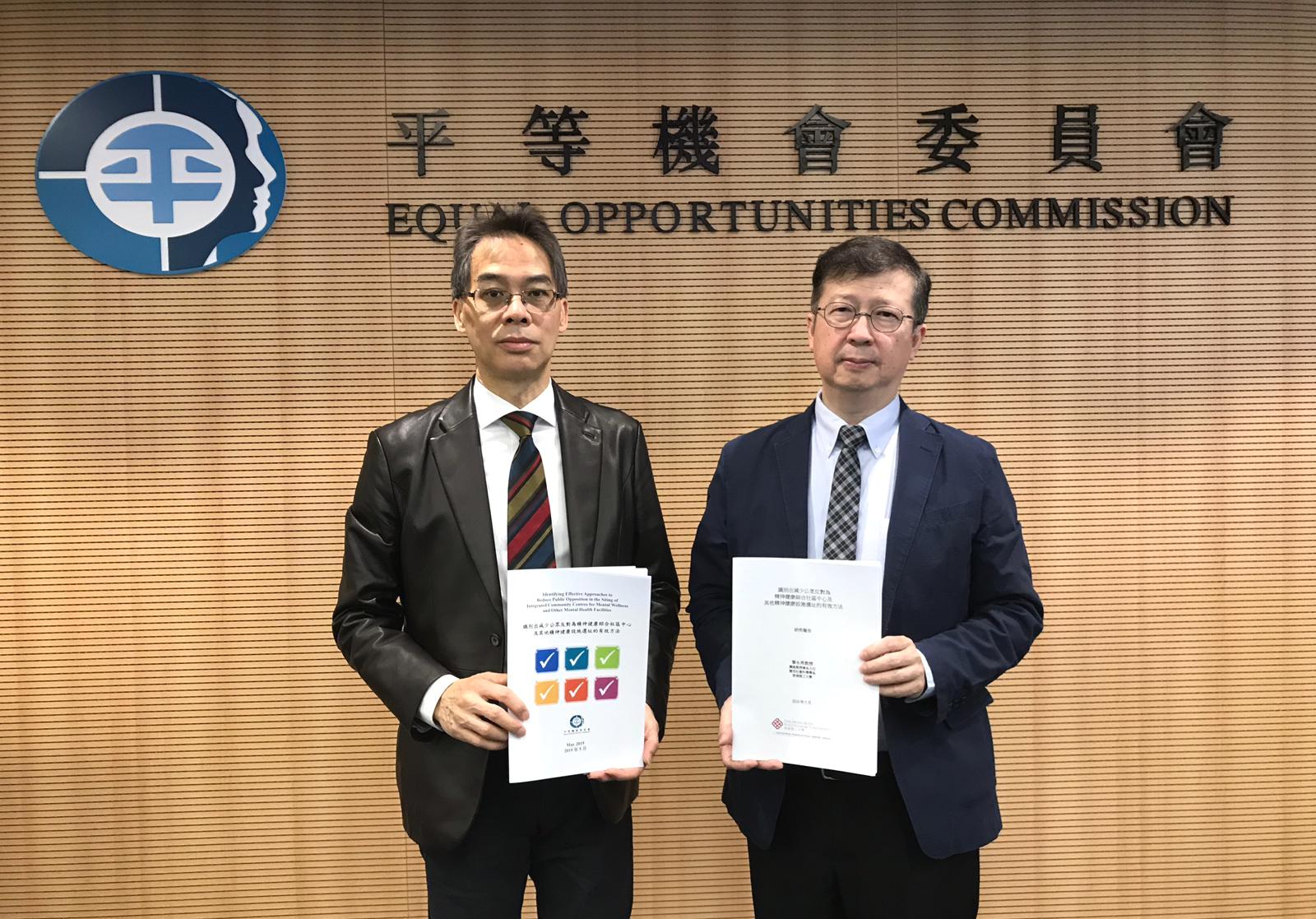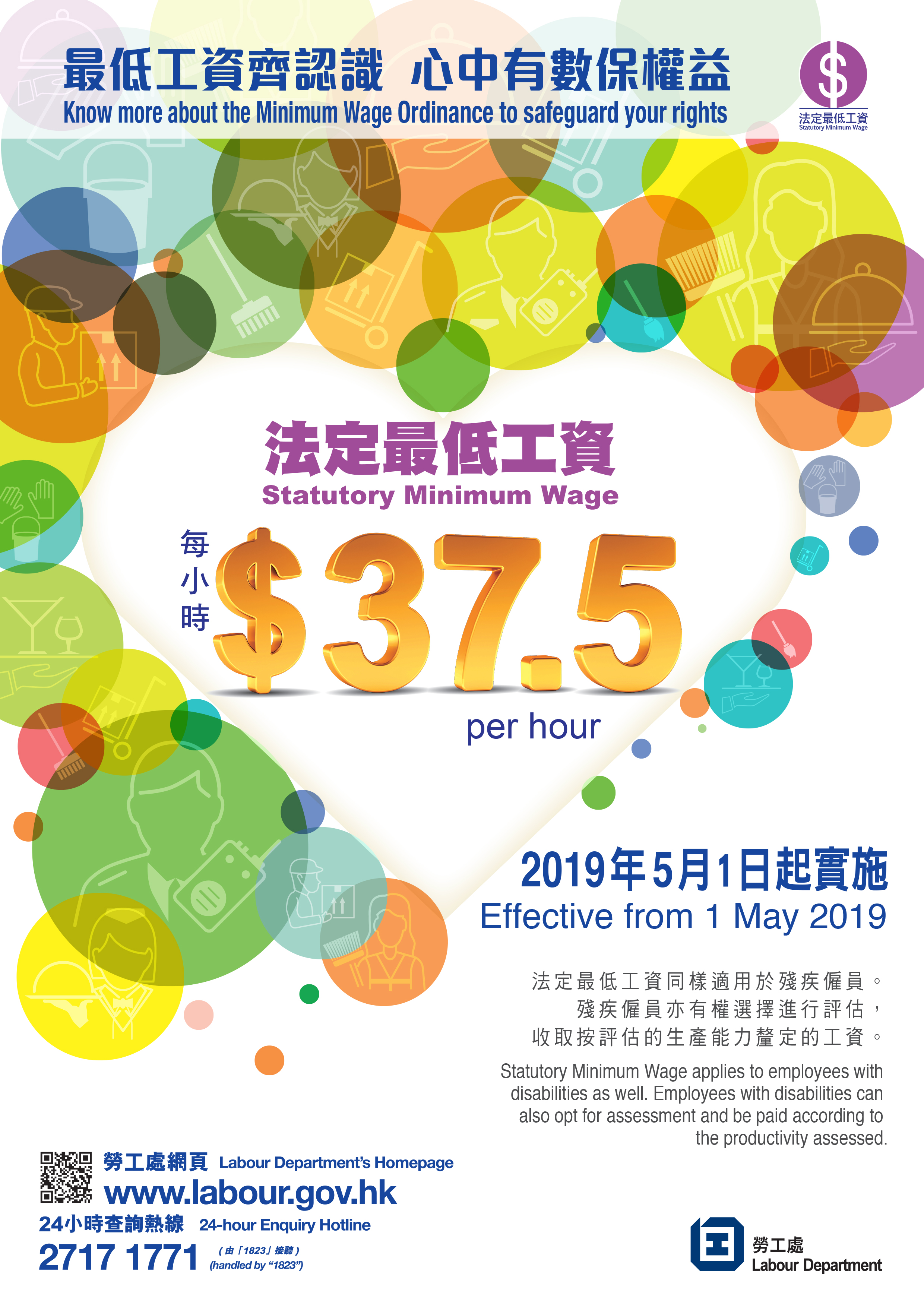|
  | |
Tel: 2511 8211 / Fax: 2511 8142 / SMS: 6972566616538 |
News from the EOC
Issue 210 | 30 May 2019 |
中文版

On 20 May 2019, EOC Chairperson Mr Ricky CHU Man-kin, along with Dr Ferrick CHU, Acting Chief Operations Officer and other representatives of the EOC, briefed the Legislative Council Panel on Constitutional Affairs on the Commission’s work in 2018/19 and its key focuses in 2019/20.
In 2018/19, the EOC achieved notable progress in three major areas of its work, namely law enforcement, prevention and education. While enhancing its complaint-handling process and registering a substantial increase in the number of complaints handled, as well as cases granted with legal assistance, the EOC spearheaded studies on sexual harassment in various fields and rolled out awareness campaigns targeted at different segments of the local community.
Moving into 2019/20, the EOC will continue to fulfil its mission of eliminating discrimination along this three-pronged approach, and place a stronger focus on tackling sexual harassment and barriers to equal opportunities confronting ethnic minorities (EMs) and people with disabilities (PWDs). Subject to availability of funds, the EOC will explore setting up a dedicated anti-sexual harassment unit to provide one-stop support for victims, including referral to counselling services and advice on complaint lodging and relevant laws. A report on stakeholders’ feedback about existing EM-related education policies and the “Chinese Language Curriculum Second Language Learning Framework” has also been planned, along with studies on employment challenges facing young PWDs and people with mental illness.
For 23 years of its operation, the EOC has strived to evolve in lockstep with changes in the social, economic and political context of Hong Kong, and pay heed to the views of stakeholders across all sectors. Moving forward, the EOC will continue to look for ways of delivering its statutory duties and functions even more efficiently and effectively.
Read the EOC's submission to the Legislative Council
2
*********************************************

In an article published in
Ming Pao Daily News,
Inmedia,
Stand News and
South China Morning Post this month, EOC Chairperson, Mr Ricky CHU Man-kin explained how his extensive experience in public service echoes the values and work of the EOC, as well as his vision for the Commission.
Inspiring Mr Chu’s previous work at the Independent Commission Against Corruption and the Independent Police Complaints Council was an unflinching belief in building a fair and just society that is free from corruption and abuse of power. “That same commitment to righting social wrongs underlies the work of the EOC, as we pledge to combat prejudice and discrimination against marginalised groups,” wrote Mr Chu. “What’s more, leading the Commission to deliver real impact on Hong Kong’s equality landscape requires not only a passion for social justice, but also solid expertise and practical experience – in handling complaints, spearheading research, and lobbying parties to bridge differences.”
Because of entrenched prejudice and polarised debates, the fight for equal opportunity may often reach a stalemate on various fronts. As an avid Go player, Mr Chu believes the key lies in adopting a strategic mindset and making the right connections. He wrote, “My vision is for the Comission to go beyond being an advocate of change, and actively create the conditions favourable for progress... I am confident that under my leadership, the EOC will make the necessary moves in bringing different sectors together to foster a truly pluralistic and inclusive society in Hong Kong.”
To read Mr Chu's article in full, please click one of the links below.
Read Mr Chu's article in South China Morning Post
Read Mr Chu's article in Ming Pao Daily News (Chinese only)
Read Mr Chu's article in Inmedia and Stand News (Chinese only)
3
*********************************************

Since October 2010, Integrated Community Centres for Mental Wellness (ICCMWs) have been providing one-stop, district-based community support services for discharged mental health patients, persons with suspected mental health problems, their family and carers, as well as residents in the respective districts. Owing to negative perceptions of persons with mental illness and fear of possible disturbances caused by service users, however, the setting up of ICCMWs has met with opposition from local communities from time to time, resulting in delays or even withdrawal of siting plans.
To evaluate different consultation mechanisms and pin down the factors that facilitate siting of ICCMWs, the EOC commissioned the Department of Applied Social Sciences of the Hong Kong Polytechnic University to conduct a study entitled “Identifying Effective Approaches to Reduce Public Opposition in the Siting of Integrated ICCMWs and Other Mental Health Facilities”.
Findings of the study were released on 29 May 2019. Based on a review of local and overseas literature about the siting of mental health facilities, the study also consisted of interviews with key stakeholders, including officials from the Social Welfare Department and Housing Department, ICCMW operators and service users, legislators, district councillors, and chairpersons of mutual aid committees and owners’ incorporations.
Besides proposing a three-stage protocol with specific time-frames and guidelines for public consultation and engagement activities, the report recommends that the classification of ICCMWs under Group B of “sensitive community facilities” in the
Hong Kong Planning Standards and Guidelines be removed, as it does not apply to facilities serving persons with other disabilities. By singling out persons affected by mental health problems, the classification may reinforce stigmatisation and discriminatory attitudes.
To read the full report, please click the link below.
Read the press release
Read the study report
Read related news
4
*********************************************

With effect from 1 May 2019, the Statutory Minimum Wage (SMW) has been raised to $37.5 per hour. While the SMW applies to all employees, including those with disabilities, the Minimum Wage Ordinance provides that employees with disabilities may opt for productivity assessment to determine whether they should be remunerated at not lower than the SMW rate or at a rate commensurate with their productivity.
For persons with disabilities (PWDs), gainful employment represents more than a source of income – it provides an opportunity to develop one’s potential and lead a meaningful life. They can also bring unique insights and make valuable contributions to the business they work for. The EOC hopes that employers will take the initiative to ensure recruitment and selection procedures are based on genuine job requirements, and offer reasonable accommodation for employees with disabilities whenever practicable. These are important steps towards promoting inclusion in the workplace.
Visit the Labour Department's website for details
Read the Code of Practice on Employment under the Disability Discrimination Ordinance
*********************************************
Visit our website or download the EOC mobile app (Apple App Store / Google Play) to stay updated on the EOC’s work and positions, and to review our press releases and calendar training. Also, stay tuned on other equal opportunities issues and community initiatives by visiting our community resources and community events pages for information from our community partners, including publications, survey reports, publicity campaigns, and upcoming conferences.


 On 20 May 2019, EOC Chairperson Mr Ricky CHU Man-kin, along with Dr Ferrick CHU, Acting Chief Operations Officer and other representatives of the EOC, briefed the Legislative Council Panel on Constitutional Affairs on the Commission’s work in 2018/19 and its key focuses in 2019/20.
On 20 May 2019, EOC Chairperson Mr Ricky CHU Man-kin, along with Dr Ferrick CHU, Acting Chief Operations Officer and other representatives of the EOC, briefed the Legislative Council Panel on Constitutional Affairs on the Commission’s work in 2018/19 and its key focuses in 2019/20. In an article published in Ming Pao Daily News, Inmedia, Stand News and South China Morning Post this month, EOC Chairperson, Mr Ricky CHU Man-kin explained how his extensive experience in public service echoes the values and work of the EOC, as well as his vision for the Commission.
In an article published in Ming Pao Daily News, Inmedia, Stand News and South China Morning Post this month, EOC Chairperson, Mr Ricky CHU Man-kin explained how his extensive experience in public service echoes the values and work of the EOC, as well as his vision for the Commission. Since October 2010, Integrated Community Centres for Mental Wellness (ICCMWs) have been providing one-stop, district-based community support services for discharged mental health patients, persons with suspected mental health problems, their family and carers, as well as residents in the respective districts. Owing to negative perceptions of persons with mental illness and fear of possible disturbances caused by service users, however, the setting up of ICCMWs has met with opposition from local communities from time to time, resulting in delays or even withdrawal of siting plans.
Since October 2010, Integrated Community Centres for Mental Wellness (ICCMWs) have been providing one-stop, district-based community support services for discharged mental health patients, persons with suspected mental health problems, their family and carers, as well as residents in the respective districts. Owing to negative perceptions of persons with mental illness and fear of possible disturbances caused by service users, however, the setting up of ICCMWs has met with opposition from local communities from time to time, resulting in delays or even withdrawal of siting plans.